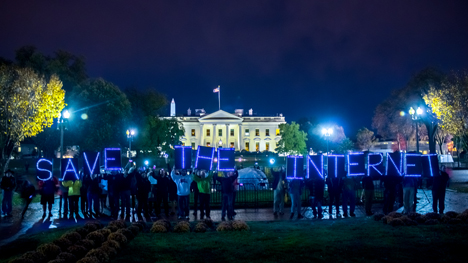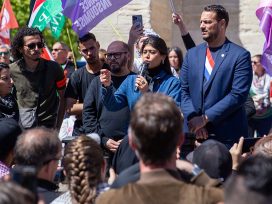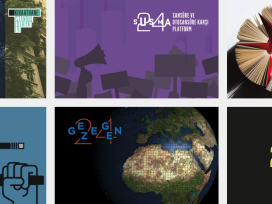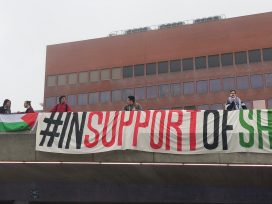On 12 March 2015, after years of spirited lobbying from both industry and citizens’ rights groups, the Federal Communications Commission (FCC) of the United States published in full its new Open Internet rules to protect the principle of net neutrality. Defined as treating the Internet like a public utility by “[treating] all content, sites, and platforms equally”, net neutrality is protected in these rules by ensuring that Internet service providers (ISPs) cannot block access to legal websites, impair traffic to websites or prioritise traffic on their networks. The rules were backed by the White House and hailed by the Electronic Freedom Foundation as “a win for Team Internet”.

Protest in front of the White House in support of net neutrality, 6 November 2014. Photo: Joseph Gruber. Source: Flickr
Net neutrality has long been viewed by citizens’ rights groups and the technical community as a necessary prerequisite for the protection of free speech on the Internet. In April 2014, the FCC proposed that Internet “fast lanes” should be permitted, which would have allowed broadband companies to give preferential access to larger corporations for a fee. A letter, dated 7 May of the same year, addressed to the FCC in support of net neutrality, contained the signatures of over 100 tech firms, including Amazon, Facebook, Google and Microsoft. The letter argued that net neutrality had enabled the Internet to be “a platform for free speech and opportunity for billions of users”, and advocated for the protection of net neutrality “to ensure that the Internet remains an open platform for speech and commerce.”
The 2015 net neutrality rules, issued less than a year after the attempt to establish fast lanes, represent an about-face for Tom Wheeler, the chairman of the FCC. Shortly before the full publication of the new rules, Wheeler spoke at Mobile World Congress in Barcelona, stating that the rules to enshrine net neutrality in law were “no more regulating the Internet than the first amendment regulates free speech in our country.”
However, not everyone was pleased with the new rules. Although some concessions were subsequently offered, in April 2015, AT&T joined the ranks of companies filing lawsuits against the FCC to overturn the new rules. Along with several industry trade groups, AT&T objected to the reclassification of the Internet as a telecommunications service, paving the way for it to be regulated as a utility much like the telephone system.
AT&T’s lawsuit echoed previous court cases challenging the FCC’s authority to regulate Internet traffic. In 2010, a federal court overturned the FCC’s 2008 censure of Comcast in response to a lawsuit brought by Comcast. The 2008 censure was related to Comcast’s decision to interfere with its subscribers’ access to file-sharing websites. Similarly, Verizon won a suit against the FCC in 2014, which overturned the FCC’s Open Internet Order issued in 2010.
Of interest in the latter case is that Verizon explicitly argued that the FCC “violated the company’s constitutional rights” by interfering with its ability to run its own broadband network. Conservative commentator Frank Miniter compared net neutrality to the Fairness Doctrine, overturned by the administration President Ronald Reagan, and stated that allowing the FCC to enforce net neutrality would enable the American left, including the Democratic Party, to “attain their goal of dominating the media”. Implied in this line of reasoning is that net neutrality – the idea that broadband providers should provide access to all legal content equally – runs counter to the principle of free speech as it violates the free speech rights of telecommunications companies.
This echoes the case of Citizens United v. Federal Election Commission, another instance where the rights of corporations came into conflict with the rights of citizens. In the Citizens United ruling, issued in January 2010, the United States supreme court upheld the rights of corporations over the rights of citizens by deciding that money spent by corporations during political campaigns constituted free speech under the First Amendment of the Constitution, and could therefore not be regulated by campaign finance laws. Citizens’ rights groups argued that the decision allowed corporations to unduly influence elections, depriving citizens of their right to freely and fairly choose their elected government.
Corporate personhood under the Fourteenth Amendment has been established in American law since the nineteenth century. As Bradley Smith points out in a 2009 article on the subject, “to deny constitutional rights to corporations would put at risk a great deal of speech protected by the First Amendment. Can corporate offices be searched without a warrant? Can a phone company withhold from the government call records of its subscribers, unless the government produces a warrant? Can the New York Times be censored because it is a corporation?” What constitutes the legitimate exercise of corporate personhood remains a matter of debate, both within the public sphere and within the legal system.
Where did the 2015 net neutrality rules draw the line between the rights of corporations and citizens? Both advocacy groups and Silicon Valley giants have insisted that the neutrality of the Internet is a basic prerequisite to free speech on the networks. Without net neutrality, broadband providers would not only be able to privilege content based on lucrative contracts, but also to discriminate against websites for political reasons. This would violate the free speech rights of not only American citizens, but also citizens of other countries who use American web services and networks, as their traffic would travel at the discretion of American broadband providers.
On the other hand, corporate personhood – the idea that individuals acting collectively should not lose their free speech rights – has been invoked by broadband providers to justify their desire to fully control their networks. According to these ISPs, to enshrine net neutrality into regulatory law is to infringe on their free speech rights, precisely because the American government would then have jurisdiction over what is and is not allowed to traverse their networks. To counteract their potential censorship of content generated by end-users, they argue, is to censor them by handing ultimate control of their networks to the government.
More broadly, the debate over net neutrality has highlighted the evolving relationship between the state, its citizens and the corporate interests it purportedly governs. In this instance, the United States decided in favour of the free speech rights of its citizens, yet its position within other law cases has been contradictory. The position of the United States government on net neutrality has ramifications far beyond its own borders. The regulation of such an important global resource as the Internet, given its impact on the free speech rights of citizens versus corporations, cannot be arbitrary and cannot be left to chance.







